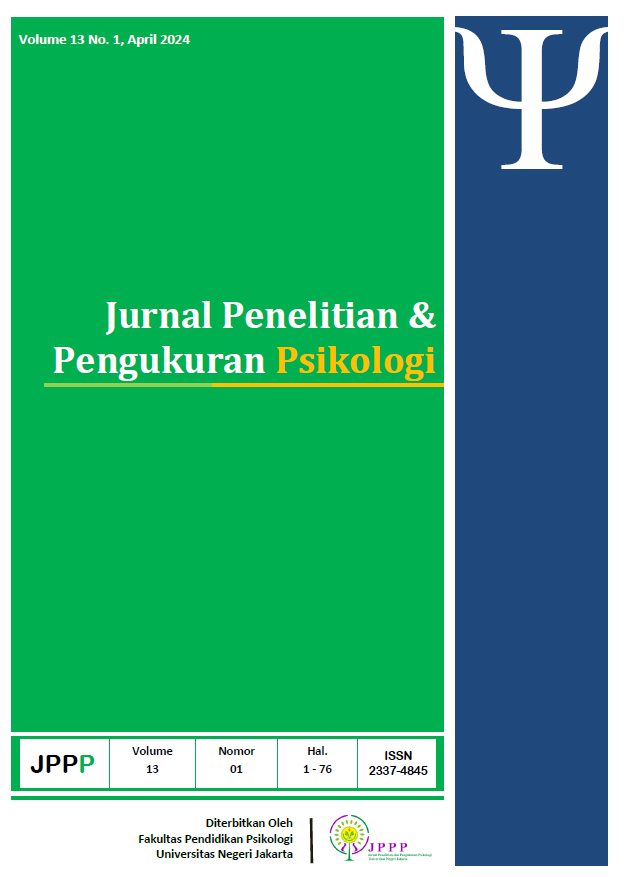Long Term Mnemonic: Keefektifan Teknik Keyword Mnemonic untuk Meningkatkan Memori Jangka Panjang Kosakata Bahasa Inggris
DOI:
https://doi.org/10.21009/JPPP.131.02Keywords:
keyword mnemonic, memori jangka panjang, kosa kataAbstract
The Psychology Major at X University uses a lot of English references. Learning effectiveness is reduced for students with poor understanding of English. Understanding a language is related to long-term memory, the system responsible for storing various information for a long time. Mnemonic techniques can be used to organizing memory. This study aims to determine whether the mnemonic method can help students to improve long term memory in mastering English vocabulary. Participants are active students of the Psychology Major at X University, aged 18-22 years. The division of participants into the experimental and control group was carried out by random assignment. The instrument used a module containing 35 English vocabularies, the mnemonic was given to the experimental group module. Posttest in this study used 20 multiple choice questions. Each correct answer is given a score of 5 and wrong is 0. This study shows that there is no significant difference (t = 0.97, Sig. = 0.17) between the experimental group (mean = 69.18, SD = 7.07) with the control group (mean = 59.23, SD = 7.36). So, it can be concluded that the mnemonic technique does not make a significant difference in learning English vocabulary
References
Biemiller, A. (2003). Vocabulary: Needed if more children are to read well. Reading Psychology, 24(3–4), 323–335. https://doi.org/10.1080/02702710390227297
Cancino, M., Silva, J., & Gatica, F. (2021). The role of visual cues in the keyword method: Assessing variations of the mnemonic approach in L2 vocabulary learning. Mextesol Journal, 45(1), 1–10. https://eric.ed.gov/?id=EJ1289124
Goldstein, E. B., & Hooff, J. C. van. (2021). Cognitive psychology (2nd ed.). Cengage Learning EMEA.
Gravetter, F. J., & Forzano, L.-A. B. (2018). Research Methods for the Behavioral Sciences (6th ed.). Cengage Learning. https://doi.org/10.4324/9780203084144-4
Loprinzi, P. D., & Frith, E. (2018). The Role of Sex in Memory Function: Considerations and Recommendations in the Context of Exercise. J Clin Med, 7(6), 132. 10.3390/jcm7060132
Malinta, Q. U. (2020). Kuesioner VARK: Bagaimana cara belajar yang terbaik bagi saya? https://vark-learn.com/kuesioner-vark/
Maulida, S. (2016). Pengaruh Mnemonic Keyword Method terhadap Recognition Memory Vocabulary Learning pada anak kelas IV Sekolah Dasar [Universitas Islam Negeri Sunan Ampel Surabaya]. http://digilib.uinsby.ac.id/14195/
Mirza, M. A., & Khurshid, K. (2020). Impact of VARK Learning Model at Tertiary Level Education. International Journal of Educational and Pedagogical Sciences, 14(5), 354–361. https://publications.waset.org/10011198/impact-of-vark-learning-model-at-tertiary-level-education
Ramdhan, V. (2017). Pengaruh Penguasaan Kosakata dan Tata Bahasa terhadap Pemahaman Membaca Teks Narasi Bahasa Inggris. Deiksis, 9(02), 240. https://doi.org/10.30998/deiksis.v9i02.1299
Rasakumaran, A. (2020). Effect of Keyword Mnemotechnics on Second Language Vocabulary Learning. Language in India, 20(8), 188–196. http://www.languageinindia.com/march2022/v22i3march2022.pdf
Richmond, A. S., Cummings, R., & Klapp, M. (2008). Transfer of the Method of Loci, Pegword, and Keyword Mnemonics in the Eighth Grade Classroom. Researcher, 21(2), 1–13. https://www.semanticscholar.org/paper/Transfer-of-the-Method-of-Loci%2C-Pegword%2C-and-in-the-Richmond-Cummings/ccd3192fb955bf4c6bb13a62f3703d319d57ca25
Shultz, K. S., Whitney, D. J., & Zickar, M. J. (2014). Measurement theory in action: Case studies and exercises (2nd ed.). Routledge. https://doi.org/10.4135/9781452224749
Sternberg, R. J., & Sternberg, K. (2017). Cognitive psychology (7th ed.). Cengage Learning.
Sudirman, N. A., & Ridha, A. A. (2017). Efektifkah Keyword Mnemonic Dalam Mempelajari Kosakata? Jurnal Ilmiah Psikologi Terapan, 5(2), 226. https://doi.org/10.22219/jipt.v5i2.4639







